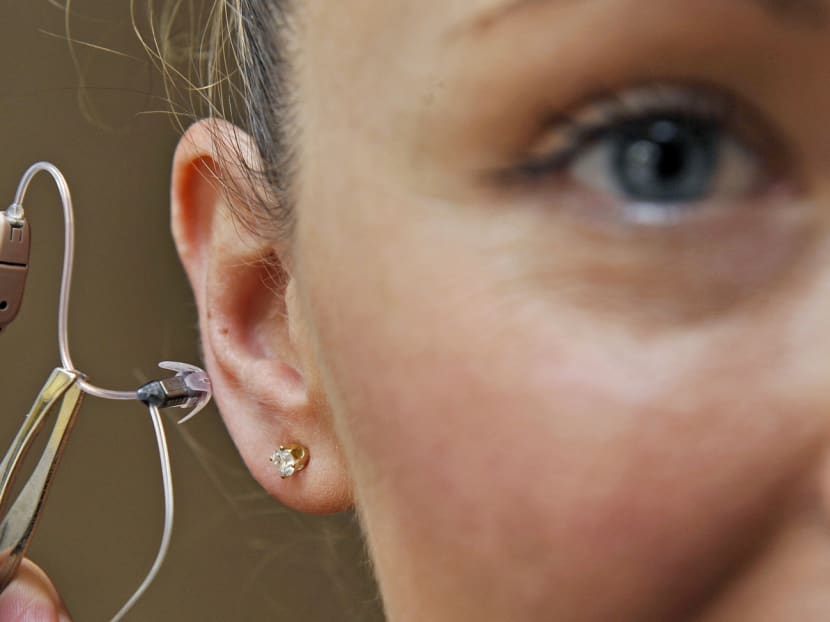Advances in medical technology offer hope to hearing-impaired
SINGAPORE — There was a time when the deaf had little choice but to retreat into the world of silent communication. However, recent medical technological advancements are offering new hope to those suffering from profound hearing loss.

A hearing aid. AFP file photo
SINGAPORE — There was a time when the deaf had little choice but to retreat into the world of silent communication. However, recent medical technological advancements are offering new hope to those suffering from profound hearing loss.
In particular, hearing implants such as cochlear or auditory brainstem implants have revolutionised the management of hearing impairment, said Dr Ho Eu Chin, a consultant at Tan Tock Seng Hospital’s Department of Otorhinolaryngology (ENT), which sees about 20 adult patients with profound hearing loss each year.
These surgically implanted devices do not amplify sounds the way conventional hearing aids do. Instead, they provide the user with a sense of sound by directly stimulating the hearing nerves (cochlear implants), or the part of the brain involved with hearing (auditory brainstem implants).
Cochlear implants, for instance, allow patients to hear and localise sounds as well as a person with healthy hearing, said Dr Annabelle Leong, consultant at Khoo Teck Puat Hospital’s (KTPH) Department of Otolaryngology. An average of 50 to 60 cochlear implantations are performed in Singapore each year.
Recent improvements in cochlear implant technology include more visually discreet models as well as wireless accessories that allow the individual to stream sound inputs from, say, phone clips or television directly to the sound processors, said Dr Leong.
The appropriate hearing device, said Dr Ho, would help the hearing-impaired integrate into society. In addition, there is now strong evidence from many developed countries to show that the majority of deaf children who receive bilateral cochlear implants before the age of one can go on to develop as normally as a normal-hearing child, he added.
About four in 1,000 babies here are born with hearing loss, said Associate Professor Henry Tan, head and senior consultant at KK Women’s and Children’s Hospital’s Department of Otolaryngology.
This excludes those who develop hearing loss after birth, which can occur due to causes such as severe and long-lasting middle-ear infections, as well as certain illnesses including meningitis, measles, chickenpox and the flu, said Assoc Prof Tan. Other causes include head injuries and exposure to very loud noises.
EARLY TREATMENT IMPROVES OUTCOMES
Hearing plays a critical role in the development of speech, as well as learning and communication skills, said Assoc Prof Tan. A local study has shown that children born with hearing loss, who received late intervention, generally fared poorly in their Primary School Leaving Examinations compared to their peers with normal hearing, he said.
The doctors stressed the importance of early detection and treatment of hearing loss. In Singapore, all newborn infants are offered a universal hearing screening.
Ideally, children born with profound hearing loss should have their cochlear implants inserted by the age of five or six, said KTPH’s Dr Leong. After this age, they are unlikely to properly develop normal speech and language due to the plasticity of the brain, said Dr Ho.
Early treatment of hearing loss is also crucial in older adults, and should be a priority in eldercare, said Dr Ho. Approximately one in four adults here has at least mild hearing loss, according to the 2010 National Health Survey. In the older age group of 60 to 69, the rate is 64 per cent.
“One of the biggest challenges for our society is the increasing social isolation of our elderly due to our rapidly changing demographic,” said Dr Ho.
“If the patient already has dementia and depression, hearing impairment can accelerate these conditions. Hearing-impaired individuals are less aware of their surroundings, and this has safety implications, for example, not hearing (an approaching) bicycle while walking in the park,” he said.
Yet about eight of the 10 elderly patients he sees would be resistant to using hearing devices to cope with their hearing loss due to denial and stigma.
SUPPORT AVAILABLE TO OFFSET COSTS
Cost is another obstacle patients face, but there are now more avenues of support. According to Dr Ho, the cost of modern digital hearing aids can vary from under S$1,000 to as high as S$6,000.
Hearing implants are costlier. For example, cochlear implants may cost from approximately S$30,000 to S$35,000 per device, and there is an additional fitting cost, said Dr Leong. However, Dr Ho said studies have shown that they are more cost-effective for deaf children in the long term.
Eligible children with a hearing impairment from needy families could receive financial aid through government subsidies and support programmes. These include Medifund Junior for their medical expenses towards hearing assessment, therapy and medical consultation, as well as the Assistive Technology Fund that provides financial assistance for prescribed hearing aids and accessories, said Mr Daniel Ng, senior medical social worker at KKH’s Medical Social Work Department. The Seniors’ Mobility and Enabling Fund (SMF) can also be used to purchase hearing aids or assistive hearing devices.
Besides government-led subsidy programmes, needy patients who require further financial assistance may also tap on existing hospital schemes.
For example, eligible KKH patients who have exhausted all options and are in need of financial assistance for medical treatment can also receive support for their medical expenses as well as prescribed hearing aids and accessories through the KKH Health Endowment Fund, said Mr Ng.
The KTPH Hearing Implant Fund offers financial assistance to needy hearing-implant candidates on a case-by-case basis.





